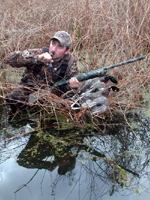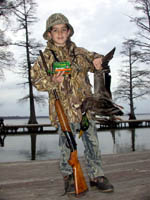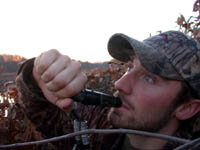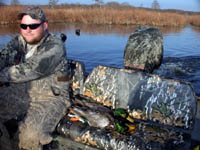
|
Features
|
|
|
|
Books
|
|
|
|
Fun & Games
|
|
|
|
Contact Us
|
|
|
John's Journal... Entry 178, Day 5
YO-YO DUCKS
Open-Water Hunts
 EDITOR'S
NOTE: For more than 20 years Billy Blakely of Troy,
Tennessee, has guided duck hunters on Reelfoot Lake in Tiptonville, Tennessee.
Reelfoot Lake is 18,765 acres of water that was formed by a series of
earthquakes that started in December of 1811 and ended in February of
1812. At that time the Mississippi River flowed backwards and spilled
over into the hole left by the earthquakes, creating Reelfoot Lake. Loaded
with shallow-water flats, cypress swamps and plenty of shallow-water areas,
this lake homes ideal duck habitat. And to make this haven for duck hunters
even better, one state and two federal waterfowl refugees are located
around the lake. Another reason Reelfoot Lake has the most-dependable
duck hunting of any area I know in the United States is due to the yo-yo
effect this area experiences during waterfowl season. "When the weather
is cold, the ducks migrate from the North to Reelfoot," Blakely explains.
"When the weather turns hot, the ducks that travel north from Mississippi
and Louisiana also stop here. Reelfoot Lake seems to be the midpoint of
the two extremes of weather during waterfowl season." This week we'll
learn how Blakely and the other guides at Blue Bank Resort consistently
take ducks at this time of the year.
EDITOR'S
NOTE: For more than 20 years Billy Blakely of Troy,
Tennessee, has guided duck hunters on Reelfoot Lake in Tiptonville, Tennessee.
Reelfoot Lake is 18,765 acres of water that was formed by a series of
earthquakes that started in December of 1811 and ended in February of
1812. At that time the Mississippi River flowed backwards and spilled
over into the hole left by the earthquakes, creating Reelfoot Lake. Loaded
with shallow-water flats, cypress swamps and plenty of shallow-water areas,
this lake homes ideal duck habitat. And to make this haven for duck hunters
even better, one state and two federal waterfowl refugees are located
around the lake. Another reason Reelfoot Lake has the most-dependable
duck hunting of any area I know in the United States is due to the yo-yo
effect this area experiences during waterfowl season. "When the weather
is cold, the ducks migrate from the North to Reelfoot," Blakely explains.
"When the weather turns hot, the ducks that travel north from Mississippi
and Louisiana also stop here. Reelfoot Lake seems to be the midpoint of
the two extremes of weather during waterfowl season." This week we'll
learn how Blakely and the other guides at Blue Bank Resort consistently
take ducks at this time of the year.
Question: Although most of your hunting is in shallow-water
flats, there are some days when you hunt the open water at Reelfoot. When
are those days, and how do you hunt?
Blakely: When the backwater starts freezing and we can't break open holes
to hunt around our blinds, we'll go out into the open water of Reelfoot
Lake. We'll use a large decoy spread with 800 to 1,000 decoys in it. When
we hunt open water, we see a lot of diving ducks such as teal and widgeon
and still plenty of mallards.
 Question:
How long will you need to put out your decoys when you're hunting in open
water?
Question:
How long will you need to put out your decoys when you're hunting in open
water?
Blakely: I'll spend about a week putting out 800 to 1,0000 decoys when
I know I'm planning to hunt open water. Once I get the decoys set out,
I'll let them sit for about a day or two so that I know the anchors are
holding to the mud on the bottom. I also have to spend about a week brushing
my blind so it looks natural.
Question: Why do you need so many decoys when you hunt
open water?
Blakely: You want your decoy spread to be bigger than any of your neighbors'
spreads, and you also want the ducks to be able to see your spread from
a long way off when they're really high. Remember: high ducks will come
in to a big decoy spread and fly past a small decoy spread.
Question: How do you set up your decoys for open-water
hunting?
Blakely: I'll put my decoys close together behind the blind so the ducks
can see the decoys but don't think they have room to land in those decoys.
Then I'll set out decoys wide around the side of the blind, creating a
horseshoe - with my blind in the center of the horseshoe. I'll leave a
little hole with the decoys in front of the blind, and 99% of the time
the ducks will land in that hole. Even when I'm hunting open water, I
want the ducks within 30 yards or less before I call the shot. When the
ducks are coming into the blind for the last time, I'll call to them even
more than I do when I am calling them in the marsh. I'll continue to quack
to them without taking a breath. I believe you have to call more and longer
when you're hunting open-water ducks than when you're hunting marsh ducks.
I chatter at the ducks (feeding call), give them a come-back call and
quack loudly to them. I want to make sure that the ducks' attention is
focused totally on the decoys in front. I don't want them to look left,
right or especially up. I'll stay on the ducks with my calling as soon
as I see that I have their attention. And I don't let up on them until
after the hunters squeeze their triggers.
 Question:
Why do you call so much to the ducks?
Question:
Why do you call so much to the ducks?
Blakely: Here at Reelfoot Lake we have a lot of competition for our ducks.
If you ease up on your calling, hunters in other blinds will call those
ducks to them. If we called the way most hunters called, we'd watch a
lot of our buddies take the ducks we were calling. So we have to call
loudly and aggressively to keep the ducks coming to us. Fast, hard, loud
calling is what a hunter has to do at Reelfoot if he's going to take ducks.
Question: Why do you like to have two people calling
in the blind?
Blakely: When we're hunting with 600 to 1,000 decoys, those ducks flying
overhead will know it's not natural to hear one person calling. If there
were that many ducks on the water, there would also be a lot of calling
going on from several different directions. This is why I have a helper
in the blind with me. When one of us starts calling the ducks, the other
one starts to call to try to sound like a flock of ducks instead of just
a few. I want as much duck calling as I can get coming from the blind
when ducks are in the air. If I have other hunters with me who can call
ducks, I encourage them to call too.
Question: What makes Reelfoot such a great duck-hunting
place?
Blakely: We're located right on the Mississippi Flyway. As the bird flies
20 minutes north of Reelfoot, the Ohio River and the Mississippi river
come together at Cairo, Illinois. So we have ducks coming down both those
river systems, meeting up at the Mississippi and coming straight to us.
I believe any duck that's flying down the Ohio or the Mississippi river
is going to drop into Reelfoot or one of these three refuges to rest,
get food and hang around a day or two before the duck continues its travels.
 Question:
What do you like best about being a duck guide?
Question:
What do you like best about being a duck guide?
Blakely: I like being able to call to the ducks, make them react to the
calls and make them come in to the call. I also have found a way to make
a living doing what I enjoy more than anything else on earth - hunting
ducks.
For more information on hunting at Reelfoot Lake, call the Blue Bank Resort at (731) 253-6878, visit www.bluebankresort.com, or write to Blue Bank at Route 1 Box 970, Tiptonville, TN 38079.
Check back each day this week for more about YO-YO DUCKS ...
Day 1 - Decoys and Blinds
Day 2 - Calls, Shells and Spreads
Day 3 - Basic Duck-Hunting Tips
Day 4 - Best Days of Duck Hunting
Day 5 - Open-Water Hunts